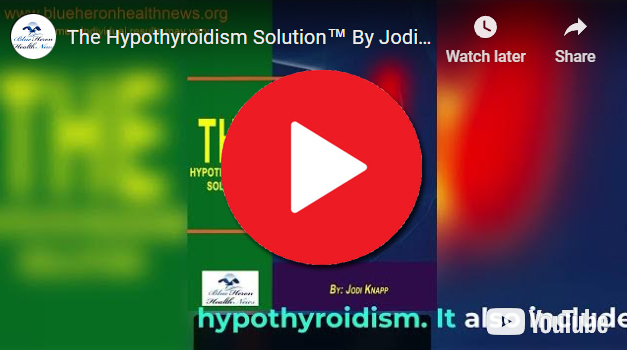
The Hypothyroidism Solution™ By Jodi Knapp Jodi has provided a stepwise guide in the form of The Hypothyroidism Solution to help you in regulating the levels of your thyroid in a better and natural way. Along with curing hypothyroidism, it can also care a number of other health issues experienced by people all over the world. No side effect due to this program has been reported so far. So you can follow this program without any financial as well as emotional risk.
How does Hashimoto’s thyroiditis contribute to hypothyroidism?
Hashimoto’s thyroiditis, also known as chronic lymphocytic thyroiditis, is the most common cause of hypothyroidism in the United States. It is an autoimmune disorder in which the body’s immune system mistakenly attacks the thyroid gland, leading to inflammation and gradual destruction of thyroid tissue. This process impairs the thyroid gland’s ability to produce sufficient thyroid hormones, ultimately leading to hypothyroidism. Here’s how Hashimoto’s thyroiditis contributes to hypothyroidism:
1. Autoimmune Attack on the Thyroid Gland
- Immune System Response: In Hashimoto’s thyroiditis, the immune system mistakenly identifies the thyroid gland as a threat and produces antibodies that attack thyroid cells. These antibodies include thyroid peroxidase antibodies (TPOAb) and thyroglobulin antibodies (TgAb).
- Inflammation: This immune response leads to chronic inflammation of the thyroid gland, known as thyroiditis. The inflammation gradually damages the thyroid tissue, impairing its function.
2. Destruction of Thyroid Cells
- Progressive Damage: Over time, the ongoing immune attack leads to the destruction of thyroid cells. As more thyroid tissue is damaged or destroyed, the gland’s ability to produce thyroid hormones (thyroxine [T4] and triiodothyronine [T3]) diminishes.
- Hormone Production Decline: With fewer healthy thyroid cells, the gland cannot produce adequate levels of thyroid hormones to meet the body’s needs, leading to hypothyroidism.
3. Reduction in Thyroid Hormone Levels
- Thyroid Hormone Deficiency: As Hashimoto’s thyroiditis progresses, the declining number of functioning thyroid cells leads to a decrease in the production of thyroid hormones. These hormones are crucial for regulating metabolism, energy levels, and many other bodily functions.
- Hypothyroidism: When the thyroid gland can no longer produce sufficient hormones, the individual develops hypothyroidism. This condition is characterized by symptoms such as fatigue, weight gain, cold intolerance, depression, and slowed heart rate.
4. Feedback Mechanism and TSH Elevation
- Pituitary Gland Response: In response to low levels of thyroid hormones in the blood, the pituitary gland produces more thyroid-stimulating hormone (TSH) in an attempt to stimulate the thyroid gland to produce more hormones.
- High TSH Levels: Elevated TSH levels are often one of the first indicators of hypothyroidism in people with Hashimoto’s thyroiditis. Despite the increase in TSH, the damaged thyroid gland may be unable to respond adequately, leading to persistent hypothyroidism.
5. Gradual Onset of Symptoms
- Slow Progression: The development of hypothyroidism in Hashimoto’s thyroiditis is usually gradual. It may take months or years for significant thyroid damage to occur and for symptoms of hypothyroidism to become noticeable.
- Subclinical Hypothyroidism: In the early stages, individuals may have subclinical hypothyroidism, where TSH levels are elevated, but thyroid hormone levels are still within the normal range. Over time, without intervention, full-blown hypothyroidism can develop.
6. Irreversible Damage
- Permanent Hypothyroidism: The damage caused by Hashimoto’s thyroiditis is typically irreversible. Once the thyroid gland is sufficiently damaged, it cannot regenerate or recover, leading to a permanent need for thyroid hormone replacement therapy in most patients.
- Lifelong Management: Individuals with Hashimoto’s thyroiditis-induced hypothyroidism usually require lifelong treatment with synthetic thyroid hormone (levothyroxine) to maintain normal thyroid hormone levels and manage symptoms.
In summary, Hashimoto’s thyroiditis contributes to hypothyroidism through an autoimmune process that leads to chronic inflammation, destruction of thyroid cells, and a consequent decline in thyroid hormone production. This progressive damage results in the thyroid gland’s inability to produce sufficient hormones, leading to the development of hypothyroidism, which often requires lifelong management.

The Hypothyroidism Solution™ By Jodi Knapp Jodi has provided a stepwise guide in the form of The Hypothyroidism Solution to help you in regulating the levels of your thyroid in a better and natural way. Along with curing hypothyroidism, it can also care a number of other health issues experienced by people all over the world. No side effect due to this program has been reported so far. So you can follow this program without any financial as well as emotional risk.